Can I teach myself forex? The answer is yes, forex trading is often viewed as a promising opportunity to generate income and attain financial freedom. The truth is not far from it, also keep in mind that it’s possible to lose your money too.
Contents
However, many people are deterred by the notion that it requires specific knowledge and skills, which leads them to believe that they cannot teach themselves forex trading. But is that really the case?
In this section, we will explore the possibility of teaching yourself forex trading and how it can lead to financial freedom.
We will also look at the benefits of self-taught forex education, the strategies and tips for self-learning, and the importance of discipline and psychology in forex trading.

Can I teach myself forex?
Yes, it is possible to teach yourself forex (foreign exchange) trading. Many successful traders have acquired their skills through self-learning.
Here are some steps you can take to teach yourself forex trading:
1. Educate Yourself: Start by learning the basics of forex trading, including terminology, market participants, and how the forex market operates.
Understand fundamental analysis, technical analysis, and sentiment analysis, which are essential tools for making informed trading decisions.
2. Read Books and Articles: There are numerous books and online resources that cover various aspects of forex trading. Look for reputable sources and authors who can provide valuable insights.
3. Take Online Courses: Many platforms offer online courses on forex trading. These courses often cover a range of topics, from beginner to advanced levels. Look for courses that suit your current knowledge and skill level.
4. Use Demo Accounts: Most forex brokers offer demo accounts that allow you to practice trading with virtual money. This is a risk-free way to apply what you’ve learned and gain hands-on experience.
5. Follow the Markets: Stay updated on market news and trends. Follow financial news websites, blogs, and forums to understand the factors influencing currency movements.
6. Develop a Trading Plan: Create a well-thought-out trading plan that includes your risk tolerance, trading goals, and strategies. Stick to your plan and continually refine it based on your experiences.
7. Practice Risk Management: Learn and implement proper risk management techniques. This includes setting stop-loss orders and not risking more than a small percentage of your trading capital on any single trade.
8. Join Trading Communities: Engage with other traders through forums, social media, or local meetups. Sharing experiences and learning from others can be beneficial.
9. Stay Disciplined: Discipline is crucial in forex trading. Stick to your trading plan, avoid emotional decision-making, and be patient. Success in trading often comes from consistency and adherence to a well-defined strategy.
10. Continue Learning: Forex markets are dynamic and constantly evolving. Stay informed about new developments and continuously educate yourself to adapt to changing market conditions.
Key Takeaways:
- Many people believe that they cannot teach themselves forex trading, but it is possible with the right resources and strategies.
- Self-taught forex education offers flexibility, independence and the ability to learn at your own pace.
- Free resources for self-study forex education are available online, including tutorials, websites and platforms.
- Effective self-learning strategies include self-paced learning, creating a forex trading plan, and utilizing various online tools.
- The significance of discipline and psychology in forex trading includes emotional control, persistence, and consistent adherence to trading rules.
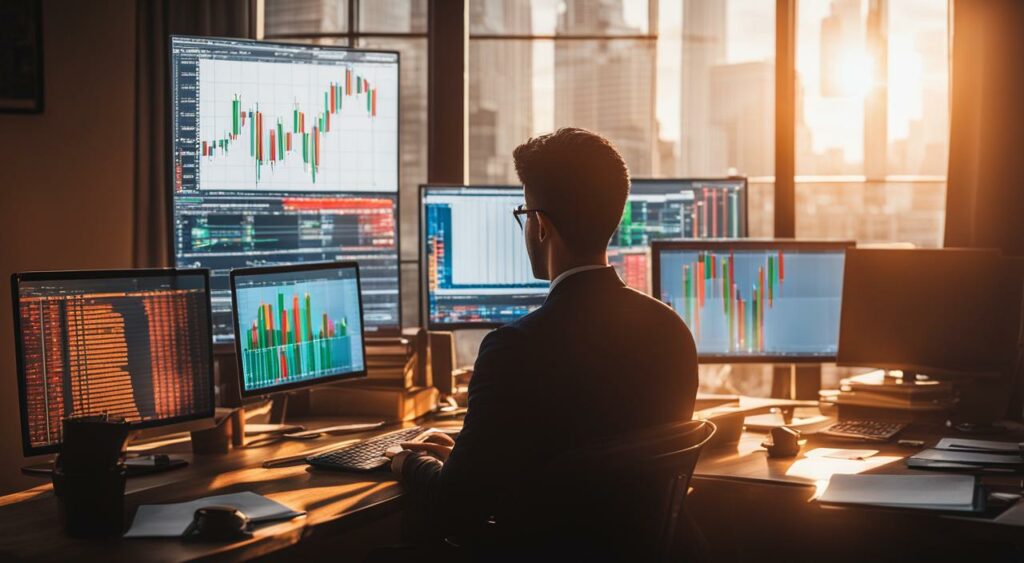
The Benefits of Self-Taught Forex Education
Forex trading is a complex and challenging field that requires extensive knowledge and skills.
While some individuals opt for professional courses or mentors, others prefer to self-teach forex trading through independent learning.
Can forex be self-taught? Absolutely. In fact, self-taught forex education has several advantages:
- Flexibility: With self-taught forex education, learners have the flexibility to learn at their own pace and on their own schedule. They can study after work, on weekends, or even during their lunch break.
- Independence: Self-taught learners have the freedom to choose their own learning materials and methods. They can explore the topics that interest them the most without any external influence.
- Cost-effective: Self-taught forex education can be significantly more cost-effective than professional courses or mentoring. Learners can access free learning resources online or purchase affordable books and courses.
Moreover, self-taught forex education can be tailored to individual learning styles. Some learners may prefer self-paced forex training.
While others may choose self-guided forex education. The choice is entirely up to the learner.
DIY Forex Education
Self-taught forex education is often referred to as DIY forex education. This approach to learning emphasizes the learner’s ability to teach themselves through independent study and research.
DIY forex education can include:
- Reading forex trading books
- Watching forex trading videos and tutorials on YouTube
- Participating in online forex trading forums
- Utilizing forex trading platforms and software for practice
DIY forex education is perfect for individuals who prefer to take control of their learning and explore their own interests.
Self-Paced Forex Training
Self-paced forex training is a form of self-taught forex education that allows learners to proceed through the material at their own pace.
This approach is ideal for individuals who have busy schedules and cannot commit to a regular class time or pace.
Self-paced forex training materials may include:
- Online forex trading courses
- Forex trading books and e-books
- Webinars and video tutorials
Self-paced forex training can be highly effective for learners who need to work at their own speed and revisit topics they find particularly challenging.
Self-Guided Forex Education
Self-guided forex education is another form of self-taught forex education that emphasizes the learner’s responsibility for their own learning.
This approach is particularly well-suited for individuals who prefer to set their own learning goals and design their own learning pathway.
Self-guided forex education can include:
- Reading forex trading books and blogs
- Watching forex trading videos and webinars
- Analyzing forex trading charts and trends
- Practicing forex trading with a demo account
Self-guided forex education may require a higher degree of self-discipline and motivation, but it can be incredibly rewarding for individuals who are willing to take charge of their own learning.
“Self-education is, I firmly believe, the only kind of education there is.” – Isaac Asimov
Indeed, self-taught forex education can be a highly effective and rewarding way to learn the intricacies of forex trading.
With the right tools, resources, and approach, individuals can unlock the potential for financial freedom and success in the forex market.
Learning Forex on Your Own: Is It Possible?
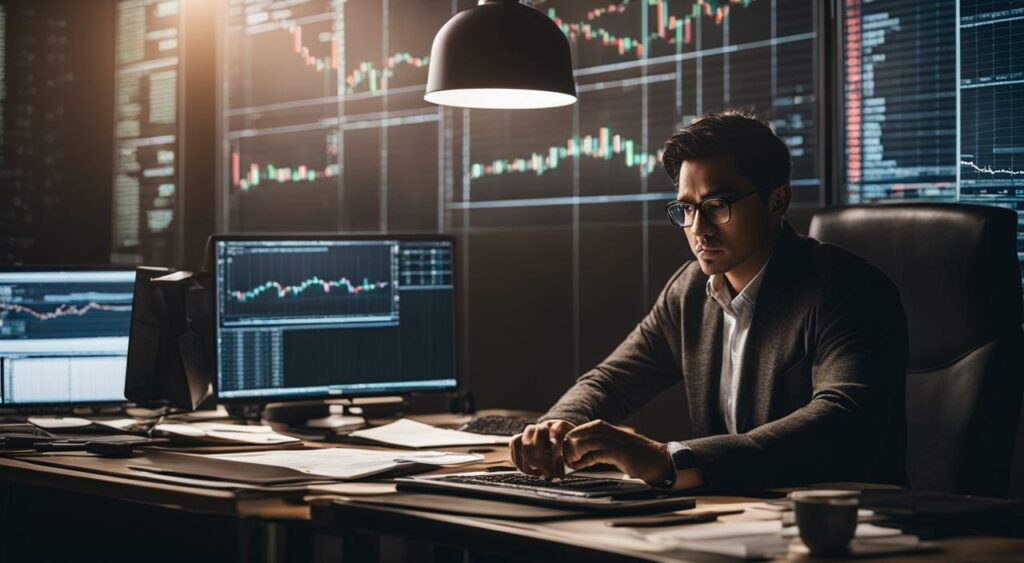
The rise of the internet has made it possible for individuals to learn just about anything on their own, including forex trading.
Many people wonder if they can teach themselves forex trading without any formal education or guidance. The answer is yes, it is possible to learn forex trading by yourself.
Forex trading is not rocket science, nor is it exclusive to only those with financial backgrounds. Anyone can start learning forex trading with enough dedication and discipline.
However, it is important to note that forex trading is a high-risk activity and requires a significant amount of practice and experience to become proficient.
There are several ways to teach yourself forex trading, including:
- Online Resources: The internet provides a wealth of resources for individuals looking to learn forex trading on their own. This includes tutorials, articles, forums, and even online courses.
- Trading Simulators: Many forex brokers offer trading simulators that mimic real market conditions and allow individuals to practice trading without risking real money.
- Books and E-Books: There are countless books and e-books available on forex trading that can be used as a self-learning tool.
It is important to note that teaching yourself forex trading requires a significant amount of self-discipline and motivation.
Without the guidance of a mentor or instructor, it can be easy to become discouraged and give up.
It is crucial to remain persistent and continue learning and practicing in order to become a successful forex trader.
While self-learning forex trading is possible, it is important to remember that it is still a complex and high-risk activity.
Anyone considering teaching themselves forex trading should proceed with caution and always practice proper risk management techniques.
Free Resources for Self-Study Forex Education

Learning forex on your own can be a challenging but rewarding endeavor.
Fortunately, there are several free resources available online that can help beginners develop a robust understanding of the forex market.
Forex Education Online is an excellent platform for those who want to learn forex trading from scratch.
It offers free courses, tutorials and articles that cover the basics of forex trading, including technical analysis, trading psychology, and risk management.
Beginners can learn at their own pace as the courses are self-paced and provide lifetime access to the material.
The website also provides a forum for community discussions and Q&A sessions.
Babypips is one of the most popular websites for forex education for beginners.
This website offers comprehensive guides, quizzes, and a user-friendly forum to help learners understand the basics of forex trading.
Babypips provides an enlightening approach to forex education, including in-depth explanations of terminology, chart reading, and trading strategies.
Investopedia is an excellent resource for those who want to learn about forex trading.
This website provides comprehensive and straightforward information on forex trading, including trading basics, technical analysis, and fundamental analysis.
The website also offers a simulator that allows learners to practice trading without risking any real money.
Online Forex Tutorials offer a wide range of forex-related topics that are suitable for new traders. The site provides a collection of educational resources, including articles, videos, webinars.
And tutorials that cover various topics such as charting techniques, price action analysis, and risk management strategies.
Yes, you can! YouTube is an excellent resource for beginners who want to learn the ins and outs of forex trading.
The platform has numerous channels that offer tutorials, analysis, and trading strategies that can help traders develop their skills.
Some popular YouTube channels for forex education include Forex Reviews, Trading 212, and ForexSignals TV.
Other forex learning resources include online forex trading courses, e-books, and webinars. Overall, there are plenty of free resources available for self-study forex education.
Beginners should take advantage of these resources to develop their knowledge and skills without incurring expenses.
Self-Learning Strategies and Tips for Forex Trading
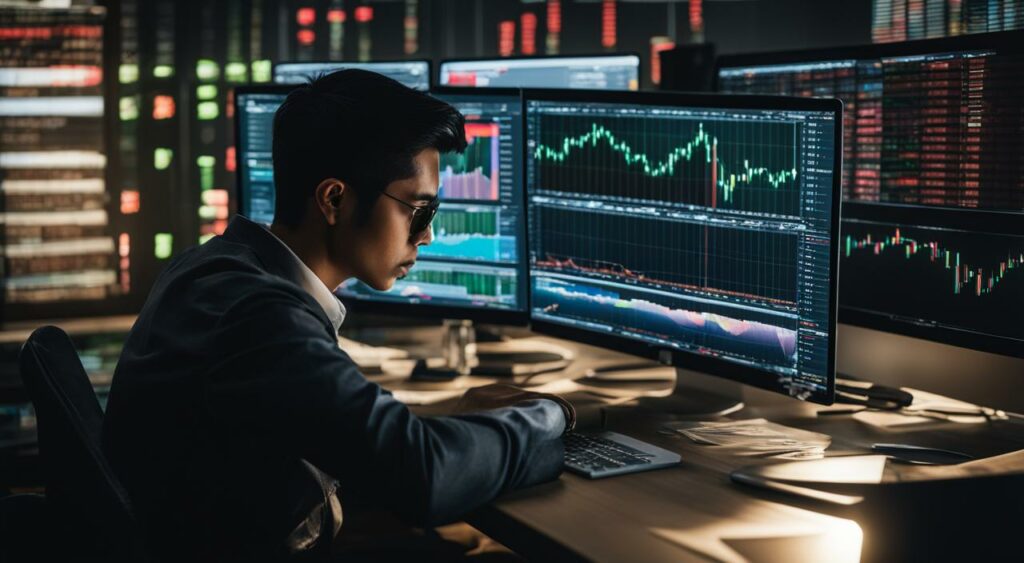
Teaching yourself forex trading requires dedication, discipline, and the right strategies. Here are some tips and techniques to help you master forex on your own:
1. Embrace Self-Study Forex Education
Self-study forex education is the cornerstone of teaching oneself forex trading.
Start with beginner-friendly materials such as BabyPips and Investopedia, and progress to more advanced resources as your knowledge grows.
2. Utilize Self-Directed Forex Learning
Self-directed forex learning allows you to focus on the areas that need improvement. Identify your strengths and weaknesses and tailor your learning experience accordingly.
Use various online tools and platforms to aid in your progress, such as forex trading simulators and chart analysis software.
3. Create a Forex Self-Study Program
Develop and follow a detailed forex self-study program that includes daily or weekly study goals.
Keep a log of your progress, and regularly review and adjust your program to ensure continued progression.
4. Practice Self-Teaching Forex Strategies
Implement self-teaching forex strategies such as self-reflection, backtesting, and journaling to track your progress and identify areas of improvement.
5. Emphasize Self-Improvement in Forex Trading
Continuous self-improvement is essential to becoming a successful forex trader. Regularly assess your progress and adjust your learning strategies as needed.
Seek feedback from other traders and take advantage of educational resources that promote lifelong learning.
By mastering forex on your own, you gain valuable skills and knowledge that can lead to financial freedom. Utilize these strategies and techniques to become a self-sufficient forex trader.
The Importance of Discipline and Psychology in Forex Trading

Forex trading is a challenging and dynamic market that requires a trader to have both a technical and psychological edge to be successful.
Trading psychology plays a crucial role in a trader’s decision-making, and a lack of emotional control can lead to disastrous consequences.
In this section, we will explore the significance of discipline and psychology in forex trading and provide insights into developing the necessary mental fortitude to navigate the volatile forex market.
Emotional Control
Emotional control is one of the most critical aspects of trading psychology.
Fear, greed, and anxiety are common emotions that traders experience and can lead to impulsive decisions that result in trading losses.
A trader’s ability to keep their emotions in check and make rational decisions based on their trading plan is essential for success in the forex market.
One way to develop emotional control is through mindfulness meditation.
By practicing mindfulness, traders can learn to regulate their emotions, develop greater awareness of their thoughts and feelings, and improve their decision-making abilities.
Additionally, having a trading plan in place and following it consistently can help reduce emotional reactions and minimize trading errors.
Persistence and Consistency
Another crucial aspect of trading psychology is persistence and consistency. Forex trading is a long-term game.
And a trader’s ability to persist through difficult trading periods and maintain consistency with their trading plan is essential.
It can be challenging to maintain discipline and stick to a plan when the market is volatile, but traders who can remain persistent and consistent are more likely to achieve long-term success.
Cutting Losses and Letting Profits Run
Discipline is critical in forex trading, and one of the most important disciplines is knowing when to cut losses and when to let profits run.
A trader’s ability to cut losses and move on from losing trades is essential for preserving trading capital and reducing the emotional impact of trading losses.
Conversely, letting profits run by setting trailing stops and taking profits at predetermined levels can help traders maximize their gains and build a profitable trading strategy over time.
Trader Personality
Finally, a trader’s personality plays a crucial role in their success in the forex market. Some traders are naturally more risk-tolerant, while others prefer a more conservative approach.
Understanding one’s personality traits and how they align with a specific trading style is essential for building a successful trading strategy.
Overall, discipline and trading psychology are critical components of successful forex trading.
By developing emotional control, persistence, consistency, and discipline, traders can improve their decision-making and trading outcomes.
Technical and Fundamental Analysis in Forex Trading
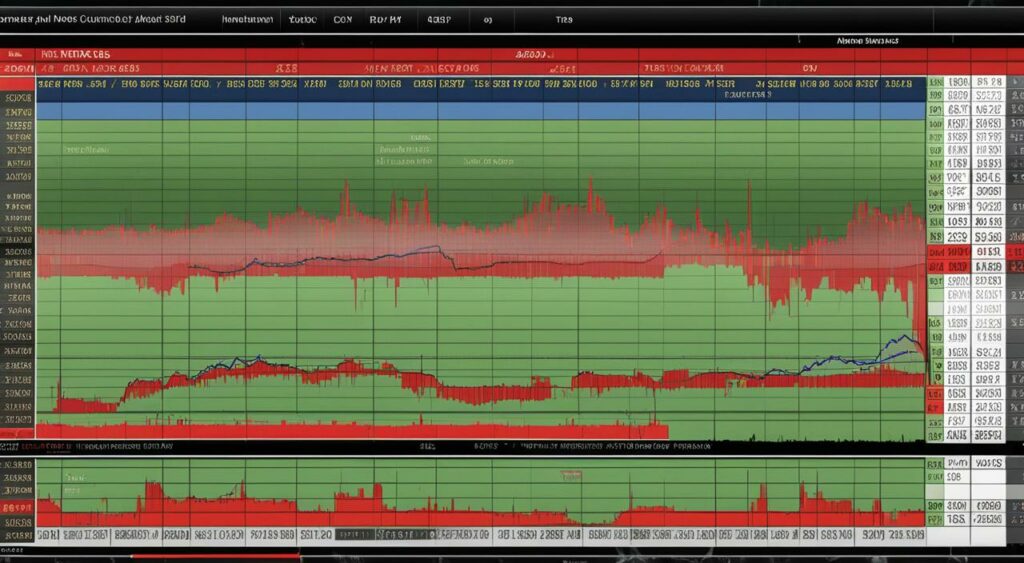
Forex trading requires a deep understanding of technical and fundamental analysis to make informed trading decisions.
Technical analysis involves studying price charts and identifying trends, chart patterns, and indicators.
A trader needs to analyze the market’s volatility and price action to determine entry and exit points and manage risk effectively.
To conduct technical analysis in forex trading, a trader needs to have knowledge of backtesting tools that help to analyze past data to identify patterns.
This analysis can help to predict future price movements, which can help traders to make informed trading decisions.
With the right technical analysis tools, traders can manage their trades and make informed decisions that maximize their profits.
Fundamental analysis, on the other hand, is the study of macroeconomic factors that can impact a currency’s value.
These factors include inflation, GDP, interest rates, central bank policies, fiscal policies, and monetary policies.
Fundamental analysis helps traders to understand the financial health of a country and predict the direction of its currency’s value.
Chart Patterns and Indicators
Chart patterns are visual representations of the market’s trends, and they can help traders identify entry and exit points in their trades.
These patterns include head and shoulders, triangles, and flags. Indicators are mathematical calculations that traders use to identify trends and forecast future price movements.
Some of the commonly used indicators in forex trading include moving averages, relative strength index (RSI), and Bollinger Bands.
Backtesting
Backtesting involves analyzing past data to test a trading strategy’s profitability.
Traders use this technique to identify the performance of a trading strategy before applying it to the live market.
By testing a strategy’s performance, a trader can optimize it and make informed decisions that maximize their profits.
Macroeconomics and Currency Value
Fundamental analysis involves evaluating a country’s economic fundamentals to understand the relative strength or weakness of its currency.
Some of the factors that fundamental analysts consider include inflation, GDP, interest rates, central bank policies, fiscal policies, and monetary policies.
By analyzing these factors, traders can determine the long-term prospects of a currency and make informed trading decisions.
Overall, technical and fundamental analysis are essential tools for successful forex trading.
Traders need to have a deep understanding of these concepts to make informed trading decisions that maximize their profits while minimizing their risks.

The Importance of Risk and Money Management in Forex Trading
When it comes to forex trading, managing risk and money is critical to success. Without effective risk and money management strategies.
Traders increase their chances of incurring substantial losses, which can quickly wipe out their trading accounts.
Risk Management
Risk management is the practice of identifying, assessing, and prioritizing potential risks and implementing strategies to mitigate or avoid them.
In forex trading, risk management involves setting stop-loss and take-profit levels to limit potential losses and maximize gains.
Traders must also understand the concept of leverage and how it can increase both profits and losses. While leverage can amplify gains, it can also lead to significant losses if not managed correctly.
As such, traders should only use leverage sparingly and set appropriate margin levels to prevent margin calls.
Hedging is another risk management strategy that involves opening opposite positions to offset potential losses.
For example, a trader who is long on a particular currency pair may also open a short position to limit their potential losses in case the market moves against them.
Money Management
Money management is the process of managing financial resources to achieve specific goals, including preserving capital, achieving consistent profits, and maximizing returns.
In forex trading, money management involves setting appropriate position sizes, managing leverage, and diversifying portfolios to minimize risk.
Traders should also be familiar with transaction costs, such as spreads and commissions, which can reduce profits.
Additionally, taxes and regulations may also impact trading activities, and traders should comply with the relevant laws and regulations in their jurisdiction.
Tools for Risk and Money Management
Various tools and strategies can help traders manage risk and money effectively, including:
- Stop-loss and take-profit orders: Setting automatic stop-loss and take-profit orders can help traders limit potential losses and lock in gains.
- Position sizing: Determining appropriate position sizes based on account size and risk tolerance can help traders avoid over-leveraging and manage risk effectively.
- Trading plan: Creating a comprehensive trading plan that outlines entry and exit strategies, risk management strategies, and money management strategies can help traders stay disciplined and improve their chances of success.
Overall, risk and money management are crucial components of successful forex trading strategies.
Traders should understand the importance of managing risk and money effectively and utilize various tools and strategies to minimize risk and maximize profits.

Conclusion
Learning forex trading on your own is a feasible and rewarding endeavor that can lead to financial freedom.
By utilizing the benefits of self-taught forex education, such as independence and self-paced learning, individuals can acquire the necessary skills and knowledge to succeed in the forex market.
There are a wide range of free resources available for self-study forex education, including websites, tutorials, and platforms that offer beginner-friendly content.
By utilizing these resources and implementing effective self-learning strategies and tips, such as creating a forex trading plan and utilizing various online tools, individuals can master forex trading on their own.
It is important to emphasize the significance of discipline and psychology in forex trading, including the importance of emotional control, persistence, and consistent adherence to trading rules.
Additionally, understanding the role of technical and fundamental analysis, risk management, and money management, can help individuals make informed trading decisions and ultimately achieve success in the forex market.
It is crucial to continuously learn and practice to hone one’s skills and adapt to the ever-changing forex market.
With dedication and hard work, individuals can teach themselves forex trading and unlock the potential for financial freedom.
Download Drunkard Walk Indicator Free
FAQ
1. Can I teach myself forex trading?
Yes, it is possible to teach yourself forex trading. With the right resources, dedication, and self-discipline, anyone can learn how to trade forex and potentially achieve financial freedom.
2. What are the benefits of self-taught forex education?
Self-taught forex education offers several advantages, including flexibility in terms of learning schedule and pace, independence in choosing learning materials and strategies, and the ability to customize your learning experience to suit your specific needs and interests.
3. Is it possible to learn forex trading on your own?
Yes, it is possible to learn forex trading on your own. While formal education and mentorship can be helpful, many successful forex traders have learned the necessary skills and knowledge through self-study and self-guided learning.
4. What are some free resources for self-study forex education?
There are various free resources available for self-study forex education, including websites like Babypips and Investopedia that offer comprehensive educational content, online tutorials, and video resources on platforms like YouTube.
5. What are some self-learning strategies and tips for forex trading?
Some self-learning strategies and tips for forex trading include setting a self-paced learning schedule, creating a trading plan, utilizing online tools and resources, practicing with demo accounts, and continuously seeking improvement through analysis and reflection.
6. How important is discipline and psychology in forex trading?
Discipline and psychology play a crucial role in forex trading. Emotional control, persistence, consistency, and adhering to trading rules are essential for making sound trading decisions and managing risks effectively.
7. What is the role of technical and fundamental analysis in forex trading?
Technical analysis involves analyzing price charts, identifying patterns, and using indicators to make trading decisions. Fundamental analysis focuses on understanding economic factors, such as inflation, GDP, interest rates, and central bank policies, to evaluate the value of currencies.
8. How do I manage risk and money in forex trading?
Effective risk management involves setting appropriate stop-loss and take-profit levels, managing leverage, understanding margin calls, and considering transaction costs and taxes. Money management involves determining position sizes, diversifying portfolios, and implementing risk-reward ratios.
9. What is the conclusion of this article?
In conclusion, teaching yourself forex trading is possible and can lead to financial freedom. Continuous learning, practice, and acquiring the necessary skills are crucial for success in the forex market. Utilize the available resources, implement effective risk and money management techniques, and approach trading with discipline and a solid understanding of both technical and fundamental analysis.



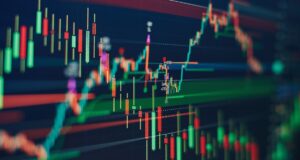
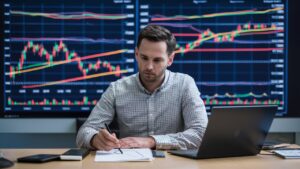


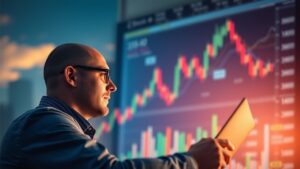

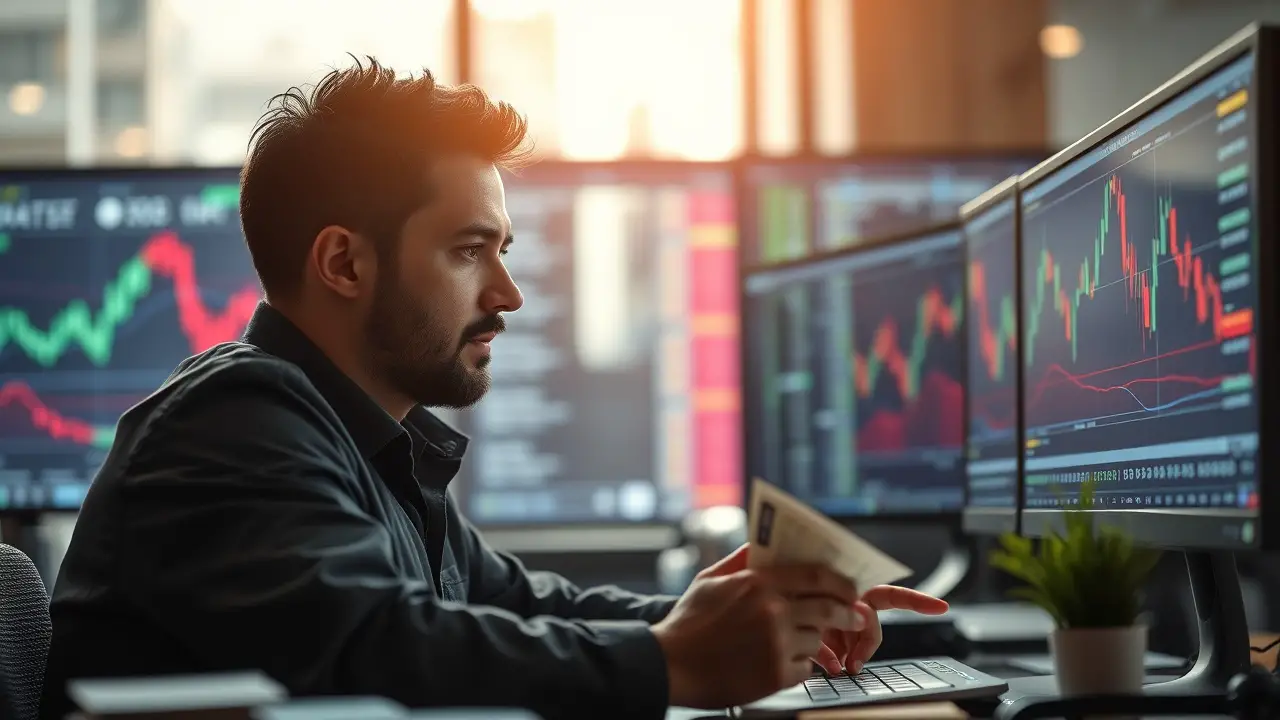

Leave a Reply